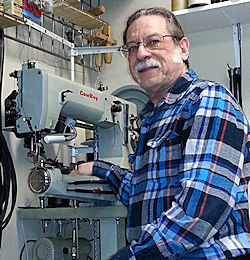In the summer of 2017, I made a short video of my Cowboy CB4500 heavy harness and holster stitcher sewing along the edge of a strap using a special set of inline feet. These aftermarket feet only take up the width of the inside foot, which is between 1/8 and 3/16 inch. They allow me to sew very close to obstacles on the left of the needle. My video, which is on YouTube, got a lot of views and questions about where to buy those inline feet. Unfortunately, the company that originally made them has gone out of business ;-(
UPDATE #1, April 2, 2019:
I just learned from Bob Kovar, owner of Toledo Industrial Sewing Machines, that he has contracted with another machine shop to produce inline presser feet for the Cowboy heavy leather stitchers. I will be getting a set shortly and will provide photos of them, followed by a description of what, if any changes need to be made to use them.
UPDATE #2: May 19, 2019:
I have finally received a set of the new, corrected Cowboy inline presser feet from Toledo Industrial Sewing Machines. Installation was a breeze! All that I did was unscrew the existing inner and outer feet and first install the front foot, positioning it so the needle is centered in the hole, then the back foot. I didn't have to change any other settings like on the original set. The heights matches the standard harness feet. You can use the standard feed dog and throat plate, or the flat slotted plate, as you prefer. You may want to back off the foot pressure as these narrow feet definitely leave an impressions (that can be rubbed out later).
NOTE: The new inline presser feet are for the Cowboy CB3200, 3500, 4500 and 5500 machines. They will also fit on a Cobra Class 4 and a Techsew 5100.
I do a lot of repairs to leather goods of all kinds, including replacing zippers, shortening sleeves, hemming chaps, fixing pockets, repairing purse straps,sewing patches onto vests and jackets, and resewing belts, holsters and saddles. Recently, a customer dropped off a dog collar that needs to be resewn with heavy bonded nylon thread. Because it is filled with dog spikes and round spots, I will have to change over my Cowboy CB4500 to use the inline presser foot set. I plan to do that next week and will shoot a video of the process and the resewing of the collar. That will be my next post on this blog.
In case you haven't seen it yet, I am embedding my original video showing the inline feet in action. Feel free to leave questions about the conversion process in the comments area.

Recent Comments